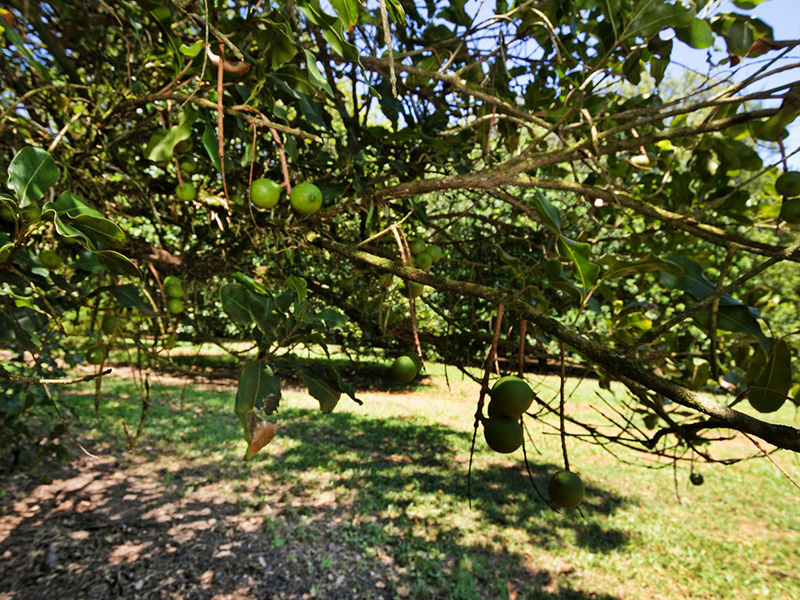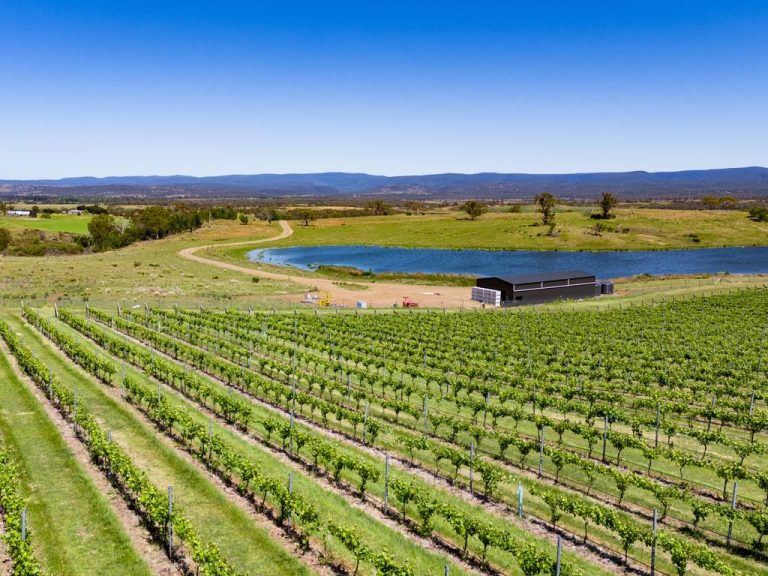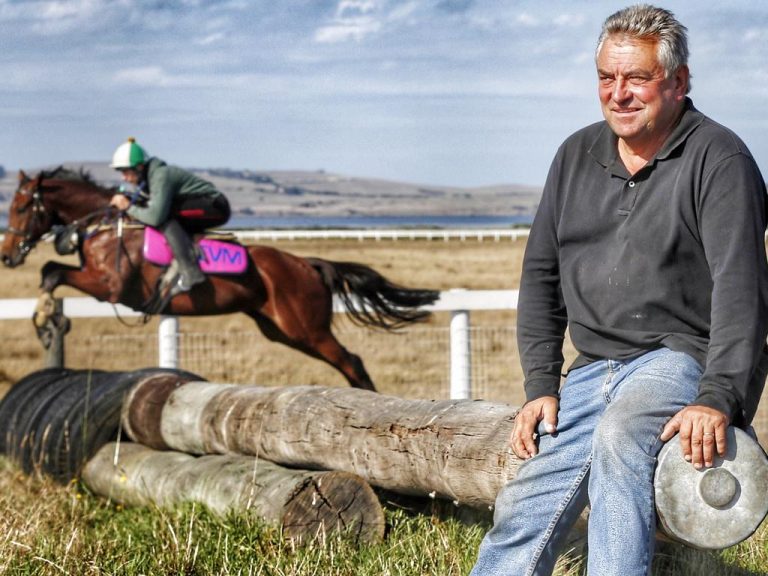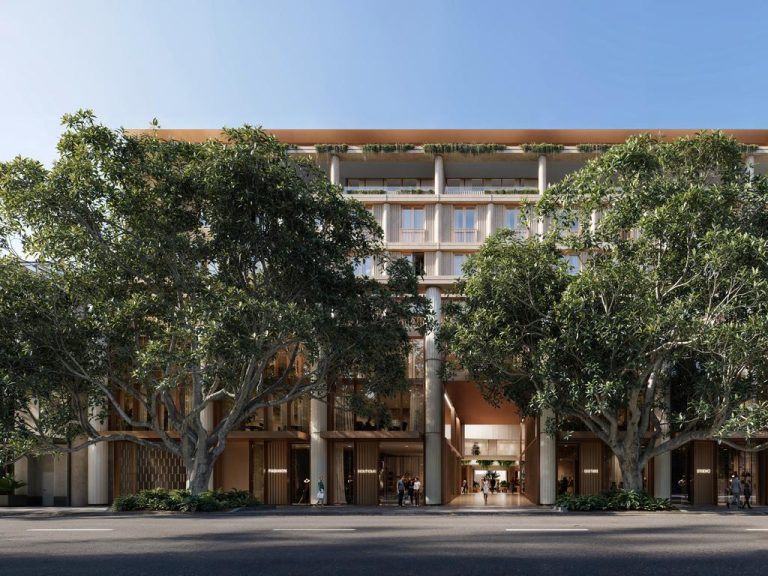Nutcracker suite: Buyers eye macadamia farms as nut focus grows

Strong buyer interest in two Byron Bay macadamia farms reflects growing demand in this lucrative niche industry.
‘Paradise’ at Eureka is the larger property and is predominantly commercial with 80 of its 101.82 hectares committed to 16,000 macadamia trees.
There is no housing on the site and the owners won’t disclose its revenue, but Paradise includes a dehusking station, sheds and storage silos with the possibility for buyers to develop in different directions.
An award-winning 38.85ha farm at Myocum is one of the highest-producing, highest-quality macadamia plantations in Byron shire.
Along with $500,000 to $700,000 in annual revenue, the property features two separate homes with one stretching across 500sqm of luxury space.
Financially fruitful and rapidly changing macadamia market
Macadamias’ domestic industry is worth $300 million at farm gates and $800 million in retail value, according to Australian Macadamia Society chief executive officer Jolyon Burnett.
Australia’s 35,000ha of macadamia orchards, representing about 10.5 million trees, and planted by 800 growers between NSW’s midcoast and Queensland’s Atherton Tablelands, amount to 50,000 tonnes of nuts grown every year, making it the country’s biggest nut crop after almonds.

Australia’s macadamia orchards are the country’s biggest nut crop after almonds. Picture: realcommercial.com.au/for-sale
“Macadamias are the most globally traded and most valuable Australian native product,” Mr Burnett said.
“80% of our crops are sold in five markets – Australia, the US, Japan, China, and Germany – and they’re then traded to over 40 countries around the world.”
China is also a major grower of macadamias and is keen to expand its plantation base, according to Herron Todd White’s national client manager – agribusiness advisory, Tim Lane.
He added that large sectors of sugar cane country in northern NSW and the Bundaberg region were being converted to macadamia farms as these areas were highly suitable for macadamia growth.
Cash to splash on a more valuable product than sugar was another reason for these conversions, Mr Lane said.
“In agriculture, money always goes to the highest, best value for the property so it often changes its use over time, depending on the next commodity that is suitable for the region where it makes commercial sense,” he said.
Also splashing cash on macadamias is a growing number of large corporate institutional-type players who are investing capital into the sector.
“Macadamias are the next frontier in the nut industry (after pecans and hazelnuts) with more corporate capital lining up,” Mr Lane explained.
“While your typical macadamia farm would be 20-40ha, you’ve now got people looking at 300-400ha places or even 1000-2000ha large scale operations.”
Versatile but rare product
The only native bush nut of Australia’s seven major nut industries – almonds, pecans, chestnuts, pistachios, hazelnuts and walnuts – is a rare product, according to Mr Burnett.
“Macadamias are a small industry and make up only 2% of the $300 billion world trade in tree nuts,” he said.
“Australia is behind South Africa by just a whisker when it comes to macadamia growing with Bundaberg being the country’s largest macadamia producing area, producing around 46% of Australia’s macadamia nuts.
“They’re also grown in Kenya, Malawi, Brazil, Guatemala, Vietnam and Hawaii.”

‘Paradise’ at Eureka includes a de-husking shed. Picture: realcommercial.com.au/for-sale
The flip side to this rarity is that macadamias are a valuable product with demand outstripping supply, Mr Burnett said.
These nuts are also highly versatile and healthy.
“Macadamias are available in over seven aisles of the supermarket and more recently, there’s been macadamia shampoos and face creams,” Mr Burnett explained.
COVID recovery for industry
COVID restrictions resulted in the first fall in macadamia prices in 10 years, however, plans to expand world trade and larger than expected crops this year contribute to a confident long-term future.
“We took a bit of a hit from COVID but we think we can grow world trade to 5%,” Mr Burnett explained.
“We don’t sell any macadamias to India or eastern Europe and these are huge markets that we still haven’t exploited.”
Mr Burnett added that macadamias may enjoy their biggest crop on record this year, with a climate-based forecast predicting it would reach almost 55,000 tonnes in-shell compared to last year’s 51,500-tonne crop.
However, the abundance of recent rain may change this outlook.
Lifestyle appeal of macadamia properties
McGrath Byron Bay’s Bill Johnston who is marketing Paradise said the farm was highly sought after, largely because it was one of the largest landholdings in the Northern Rivers region and very close to Byron Bay.

There are also two large dams on the Eureka property. Picture: realcommercial.com.au/for-sale
Mr Johnston added the farm’s multiple future options had strengthened buyer interest, with new owners able to enjoy a return on its macadamia trees or develop it into something different.
“It’s a blank canvas that way,” he said.
Meanwhile, the family-owned macadamia farm at Myocum is a very reluctant sale for its 70-year-old owner, who runs the property with his son.
First National Byron’s Sales manager Tara Torkkola explained that the farm had been in the family for four generations, with the owner living for years in an old shed on the property before he built a Mediterranean-style four-bedroom home there in 2002.

The macadamia farm at Myocum includes two separate luxury homes and a resort-style pool overlooking the orchards. Picture: realcommercial.com.au/for-sale
“The second house on the property was built for his daughter who was married at the property and has got two little boys so it’s a multi-generational living scenario,” Ms Torkkola said.
“The only reason they’re selling is that the owner is getting on and the family have convinced him that he’s just got to let it go.”
Ms Torkkola said a mix of people were interested in the property with many keen to enjoy a large acreage with an established income and the potential to employ a manager to care for the farm.
On this point, however, Mr Burnett warned that even with experienced managers on-site, macadamia farming isn’t the relaxing affair many city tree changers may expect it to be.
“Macadamias are grown in some of the most beautiful parts of Australia and it appears to be a very relaxing lifestyle so we get people from all walks of life buying these farms,” he said.
“Some of them pick it up well and become some of our best growers and others struggle because it’s as tricky to run a macadamia farm well as it is to run a good business of any sort.”
Macadamias are now falling in orchards throughout the country as harvesting begins with the season continuing until about August.
Paradise is for sale via expressions of interest which close Friday, March 11 at 4pm, and has a price guide of $15 million.
96 The Manse Rd, Myocum, is for sale with a price guide of $10 million.







